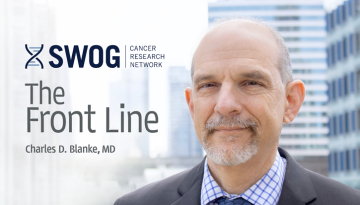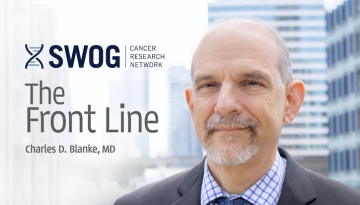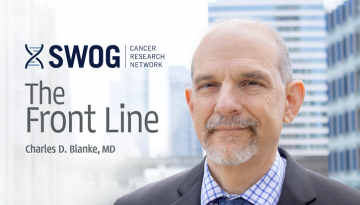Better Integration of Community Oncologists into All We Do
The need to strengthen SWOG's engagement with community-based oncologists and community member sites has been a recurring theme in our strategic planning discussions.
In recent years, community sites – specifically within the NCI Community Oncology Research Program (NCORP) – have accounted for about one-half of all SWOG-credited trial accrual. In fact, in 2023 the contribution of NCORP institutions was well over one-half of all enrollments.
The challenge we face is ensuring community oncologists based at those sites are consistently well represented at the table through all stages of trial development and execution.
Our lung committee has been a clear leader in charting progress on this front.
In the fall of 2017, then lung committee chair Dr. Karen Kelly proposed forming a community engagement subcommittee (CESC) to increase and improve engagement with the committee’s community-based providers.
The CESC was convened in early 2018, chaired by Dr. Paul Hesketh. Today, the group meets monthly and includes more than a half-dozen lung committee investigators, plus a patient advocate and a diversity, equity, and inclusion (DEI) champion.
A key function of this subcommittee is to provide input – and channel input from a wider group of community-based providers – during the trial development process. This includes reviewing trial designs in the context of community expectations and identifying potential barriers to conducting a trial at community sites.
They do this in close collaboration with the lung community oncology support group, a panel of lung committee members based at community sites who provide essential feedback from that perspective as trials move through development.
As trials approach launch and once they’re underway, the CESC champions them among community-based providers and sites, and it participates in a range of related accrual enhancement initiatives.
A major focus of CESC efforts since late 2022 has been SWOG’s S2302 Pragmatica-Lung trial, and ensuring that this streamlined study, designed from the ground up to be easy for community sites to open and accrue to, achieves the potential of its pragmatic design.
Subcommittee members have presented the study to investigator meetings at a number of key NCORPs, including intensive, in-person outreach – led by lung committee DEI champion Lucy Gansauer – to selected NCORPs in the Southeast that serve large African American populations.
Pragmatica-Lung celebrates one year as an active trial this week, and it’s a resounding success in both its overall rate of enrollment (370 patients accrued as of the one-year mark) and the representativeness of that enrollment. The CESC (working synergistically with lung’s DEI champion) is a significant contributor to that success.
Not coincidentally, the first of those 370 Pragmatica-Lung patients was a patient of Dr. Hesketh’s, enrolled at Lahey Hospital and Medical Center just eight days after trial activation, which we believe may be some sort of activation-to-first-enrollment record.
Of course, the CESC model is only one approach to more formally integrating community oncology engagement efforts into SWOG’s work. This intra-committee approach, in which each research committee forms its own CESC or similar internal structure, contrasts with the inter-committee approach, in which we would establish a central community oncology committee to guide our efforts throughout the group.
The Alliance for Clinical Trials in Oncology has set the bar in taking this latter approach, having formed a community oncology committee more than a decade ago. That committee – now almost 200 strong – is charged with advocating for community member involvement in all of the group’s work.
While we haven’t made final decisions on what SWOG’s enhanced efforts will look like, any approach we choose is likely to require that every new protocol include a community oncology co-chair as part of the study team.
I think we can draw a lesson here from our exemplary success in recent years in integrating patient advocates into the work of our research committees – why can’t we build a similar process for integrating community-based oncologists into that work?
Whichever SWOG-wide approach we adopt, expect to hear more about it in this space in the coming months. With community sites now enrolling more than one of every two patients we accrue to our studies, it’s clear those sites – and the care providers based at those sites – are essential to our continued success.
___________________________________________________
Trial of the Week
S1803: Phase III Study of Daratumumab/rHuPH20 (NSC- 810307) + Lenalidomide or Lenalidomide as Post-Autologous Stem Cell Transplant Maintenance Therapy in Patients with Multiple Myeloma (MM) Using Minimal Residual Disease to Direct Therapy Duration (DRAMMATIC Study)
The DRAMMATIC Study (S1803) is enrolling adults, age 18 to 75, with symptomatic multiple myeloma that required systemic induction therapy before an autologous stem cell transplant.
In the first of two randomizations, patients are randomized to lenalidomide versus lenalidomide plus daratumumab. After two years of treatment, patients are assessed for minimal residual disease (MRD). Those who are MRD-positive continue their assigned treatment. Those who are MRD-negative undergo a second randomization – to either continuing their assigned treatment or stopping that treatment.
The primary endpoint compared across arms is overall survival. Secondary endpoints include progression-free survival, best overall response rate, and MRD negativity.
The trial also compares patient-reported health-related quality of life at 24 months and at 48 months after the first randomization.
S1803 closed temporarily last March, as it approached the accrual goal for Registration Step 1, but it reopened for accrual in November 2023, with the sample size increased from the previous 1,100 to 1,420. This new goal should ensure enough participants are enrolled to adequately power the study’s second randomization.
S1803 was activated in 2019 and has enrolled 1,088 patients to date, at 176 sites. The study has been opened at about 700 sites all told.
Amrita Krishnan, MD, is S1803 study chair, and Dr. Krishnan’s home institution, City of Hope Medical Center, is the top accruer to the trial, having enrolled 104 patients (more than the next two accrual leaders combined!).
Learn more on the SWOG S1803 page or the CTSU S1803 page.
Other Recent Stories



